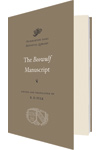Any high-schooler who’s battled his way through Beowulf could tell you that it’s long on gore—zany, cartoon-type gore, with a constant lopping off of heads, limbs, you name it. There’s a dragon, and a monster named Grendel with a monster for a mother who’s a right bitch. It’s a wonder Rob Zombie hasn’t splattered out some filmic homage. But few readers of Beowulf seem to be aware that it’s an excised text, an excerpt from a multi-author volume that functions as a coherent single work, despite missing passages.
The manuscript of Beowulf was just part of what’s known as a “codex” to antiquarians, a collection of texts tantamount to a literary collage. This particular collection—commonly referred to as the Nowell Codex, after Laurence Nowell, its sixteenth-century owner—has never been previously available in book form with the additional four texts that an ancient anthologist originally bound with Beowulf. The Nowell Codex has been through its own kind of hell—set on fire, torn, stripped, and further damaged by rebinding efforts. Digital technology has helped to decipher the words beneath its various pockmarks, and now we finally get those four other texts—The Passion of Saint Christopher, The Wonders of the East, The Letter of Alexander the Great to Aristotle (all prose works), and Judith (an epic poem)—with Beowulf itself wedged in the penultimate slot.
These are all violent pieces, with loads of Christian imagery mashed up against what seems like a love of all things pagan. Christopher is a sort of variation on the Job story, with the devil popping up, albeit less directly than in the Bible. It’s stately and meditative, delivered in Old Testament–style prose but without the same grim, draconian bent. The Wonders of the East begins as a travelogue piece that feels like something Patrick Leigh Fermor might have written, until our anonymous writer commences with a profile of Babylonian hunting women who have “beards as far down as their breast.” The Letter of Alexander the Great to Aristotle is just that—an epistle from student to teacher. Alexander begins by declaring, “I am always thinking of you” —almost as one would in a love letter—and then ruminates on recent battles, applying Aristotelian methods of discourse. One would think the old man would have been pleased.
Judith, which...
You have reached your article limit
Sign up for a digital subscription and continue reading all new issues, plus our entire archives, for just $1.50/month.
Already a subscriber? Sign in





